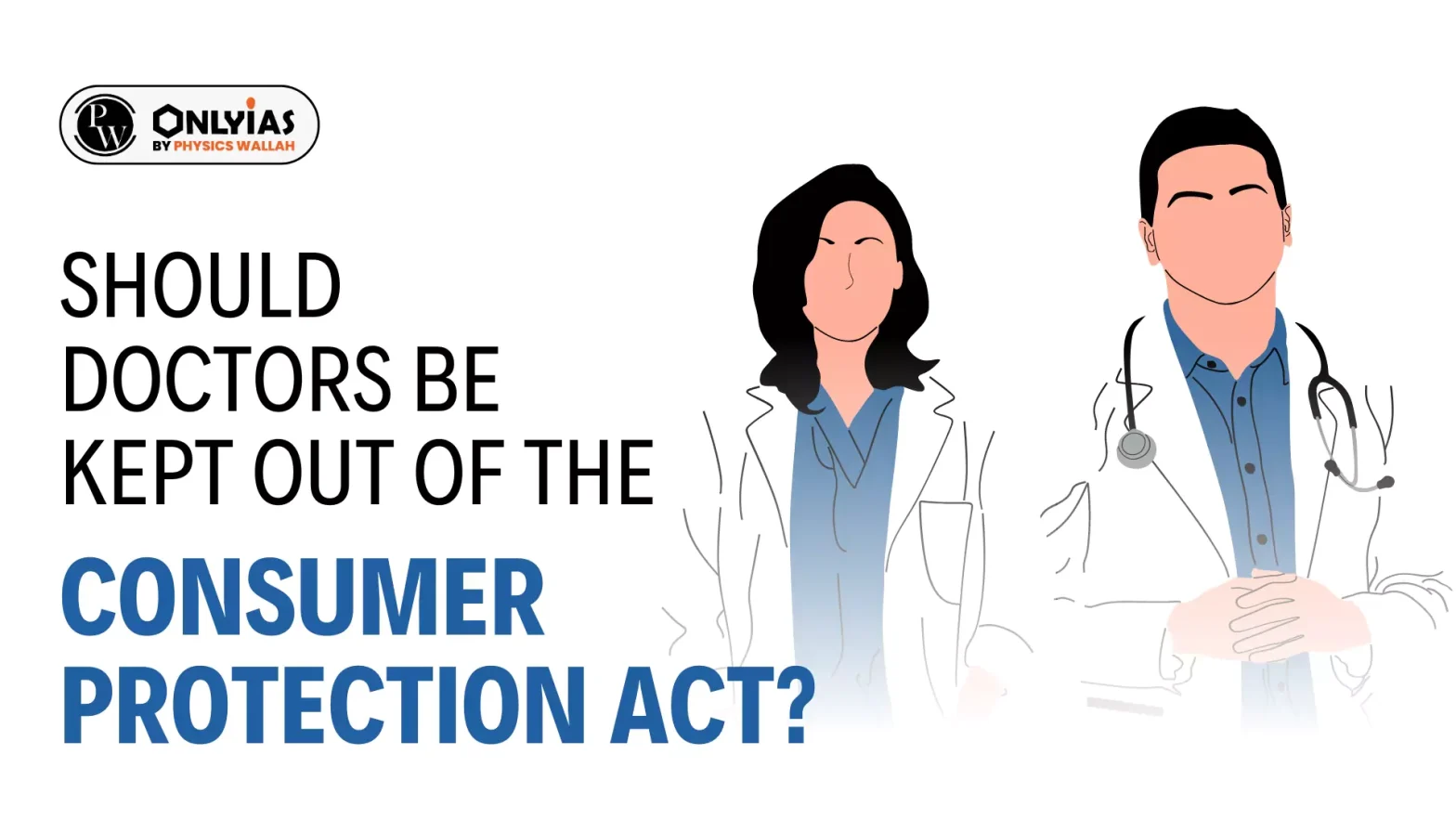Context
Recently, the Supreme Court ruled that advocates cannot be held liable under the Consumer Protection Act, 1986, for deficiency in service.
Arguments for Keeping Doctors under the Consumer Protection Act
- Clarification of Medical Service Provision: The Supreme Court’s reevaluation of the 1995 case is appreciated for clarifying the term ‘service’.
- In the landmark Indian Medical Association v. V.P. Shantha case, it was determined that doctors, medical professionals, and hospitals are included under the Consumer Protection Act as service providers.
- This acknowledges the specialized nature of medical practice, characterized by extensive research and advanced procedures, demanding meticulous patient care.
Enroll now for UPSC Online Course
- Effective Grievance Redressal Mechanism: Patients resorting to the Consumer Protection Act is deemed appropriate as it provides an essential avenue for addressing grievances.
- Without Consumer Disputes Redressal Commissions, patients lack an effective platform for redressal.
- Limitations of Medical Regulation: While the Indian Medical Council Act deals with misconduct by doctors, it may not adequately compensate affected patients.
- Additionally, the National Medical Council’s powers to award compensation are limited, and criminal law is typically invoked only in severe cases.
- Civil law remedies, though available, often involve lengthy trials and deter patients from seeking legal recourse.
- Benefits of Consumer Protection Act: The Consumer Protection Act, designed to safeguard consumer rights, offers a more accessible route for addressing grievances, recognizing patients as consumers of medical services.
- Patient Redressal Opportunities: The 1995 judgment and the Consumer Protection Act largely provide patients with the opportunity to address malpractice and seek redress.
- Fairness in Consumer Protection Act: The remedies offered by the Act are beneficial to patients, and there have been no instances of unfair judgments from the redressal agencies. Complex cases receive expert opinions before decisions are made.
Arguments Against Keeping Doctors under the Consumer Protection Act
- Concerns of Misuse in Healthcare Legislation: Some individuals exploit the Act to evade medical fees, causing distress for healthcare providers.
- Patients may blame doctors and hospitals when outcomes are unfavorable, leading to increased scrutiny and costs.
- Doctors may order unnecessary tests as a precaution, adding to procedure expenses. Comprehensive record-keeping is essential to substantiate treatment decisions in case of disputes.
- Legal Strain on Doctors: In instances of gross negligence, legal action is justified, but for those who have performed well, facing prolonged legal battles is unfair. Patients often escalate disputes through multiple levels of legal recourse, leading to lengthy and burdensome processes that drain the morale of doctors.
- Frivolous Litigation Challenges: Despite their qualifications and willingness to help patients, doctors endure the strain of delays and frivolous litigation, particularly from individuals seeking to evade payment.
Way Forward
- Assessing Frivolous Cases: For consumers, conducting a study to assess the prevalence of frivolous cases is essential. In most instances, grievances are genuine or stem from a belief of wrongdoing by the doctor. A lack of timely information provision exacerbates the issue
- Timely Complaint Resolution: Addressing the delay in consumer commissions, which can span 10-12 years, is crucial to uphold the Act’s objective of providing swift complaint resolution.
- Compensation Solutions: Addressing malpractice differs from compensating aggrieved consumers.
- Independent Oversight: Establishing an independent authority akin to ombudsmen in other sectors could serve as a preliminary step. This body could offer initial redressal before resorting to consumer courts.
- This authority should possess the necessary powers to regulate the medical field.
- Mediation: Additionally, exploring options for mediation within the Consumer Protection Act, particularly regarding medical negligence, warrants attention.
- Insurance Risk Mitigatio
- n: Additionally, many doctors opt for medical indemnity insurance to mitigate risks. However, resorting to legal proceedings remains challenging despite having insurance coverage.
Conclusion
Adhering to checklist protocols for record-keeping, obtaining informed consent, transparently discussing procedure risks and outcomes, and promptly referring patients in case of complications can shield physicians from litigation.
Enroll now for UPSC Online Classes
![]() 24 May 2024
24 May 2024
